|
The UGC supports the institutions’ academic research
activities through the allocation of the block grant, funding for research postgraduate places and various competitive research funding schemes such as Areas of
Excellence, General Research Fund Scheme, Collaborative Research Fund Scheme and Joint Research
Schemes with the
Mainland and overseas countries. Through financial incentives and encouraging sharing of best practices
among institutions and with overseas counterparts, the UGC also encourages institutions further to strengthen
and broaden their endeavours in transferring knowledge, technology and other forms of research outputs into real
socio-economic benefits and impacts for the community and businesses.
Starting from 2009-10, the UGC began to use the
investment income of the $18 billion Research Endowment Fund to top up its allocation to the RGC supporting
various competitive research funding schemes under its schedule. A portion of the Fund will be used to finance
research projects on specific themes under the Themebased Research Scheme. Additional resources have been
given to provide an extra 800 research postgraduate places. Among them, about 30% are reserved for the
new Hong Kong PhD Fellowship Scheme designed to internationalize Hong Kong’s PhD programmes. The
remaining places are allocated to institutions through other means of competitive allocation. (Please see the
chapter “Driving Excellence through Enhancing Competitiveness”)
Whereas the RGC is responsible for carrying out peer
review of project-based research grant proposals, the UGC established a Research Group to advise on
the strategy to promote excellence in research and to review the research assessment and funding method.
Its objective includes working closely with institutions at such matters as how the research funding and research
postgraduate student places should best be distributed to drive excellence, how to encourage research while keeping an appropriate balance with teaching, how to
maintain and promote role differentiation, what is the best and effective way to allocate the research resources, etc.
The UGC has continued its efforts in taking the research
results to the community by organising lectures and publishing newsletters to share the research findings and
policy recommendations with the community.
UGC Funding Support for institutions
(a) Research Expenditure and Funding
The UGC-funded institutions continue to pursue research vigorously. Their reported aggregate
expenditure on research in 2009/10 amounted to HK$6,835.1 million, representing 42% of the total
expenditure in the academic departments of the institutions, and 0.4% of Hong Kong GDP. UGC
and RGC funding, in the form of block grants and competitive research grants respectively,
constituted the bulk of research funding for the institutions. Together, the two sources of
funding made up about 75% of the total research expenditure in 2009/10 – breakdown is at Table 1.
Table 1 – Research
Expenditure of UGC-funded Institutions 2009/10
(b) Earmarked Competitive Research Grant
Apart from the block grants allocated by the UGC, the Earmarked Research Grant is the largest
single source of funding for supporting academic research in Hong Kong’s higher education– and
is managed and disbursed by the RGC based on competition and peer review. For 2010/11,
the RGC administered a total of HK$775 million through its various funding schemes, an increase
of about 4% as compared with 2009/10. There are four main funding schemes under the RGC: the
General Research Fund; the Collaborative Research Fund; the Direct Allocation; and the Joint Research
Schemes. The budgeted distribution amongst the major funding schemes is set out in Table 2.
Table 2 – Budgeted
Distribution of Earmarked Research Grants 2010/11
Details of how these schemes operate and the
success rates can be found on the RGC website(www.ugc.edu.hk/eng/rgc) and in its Annual Report.
(c) Research Endowment Fund
The $18 billion Research Endowment Fund (REF) was established in February 2009 after approval
was granted by the Legislative Council. The Fund has been set up as a trust under the Permanent
Secretary for Education Incorporated. Its investment income replaces the existing earmarked
research grants of the RGC, thus providing greater funding stability and certainty. A portion of its
investment income will also support theme-based research, thus allowing the institutions to work
on research proposals on themes of a more long-term nature and strategically beneficial to the
development of Hong Kong.
(d) Theme-based Research Scheme
The Scheme is funded by the investment income from up to $4 billion of the Research Endowment
Fund (i.e. about $200 million per annum assuming a 5% return). The objective of the scheme is to
focus academic research efforts of the UGC-funded institutions on themes of strategic
importance to the long-term development of Hong Kong. The Education Bureau is responsible for
setting research themes for the Scheme, and the Bureau has established a Steering Committee
on Research Themes to advise on this. After a series of consultation, including with the UGC,
the RGC and the academic community, three themes were selected by the Education Bureau.
Following that, the RGC worked with the local academic community and external experts, through
compilation and scrutiny of “white papers” on proposed topics and in-depth discussion and
deliberation at seminars and meetings, to formulate eleven proposed “grand challenge” topics, which
were subsequently agreed by the Education Bureau upon the advice of the Steering Committee. The
themes and topics for the first round applications are set out below:
Theme: “Promoting good health”
– Infectious diseases
– Genomic medicine
– Stem cells and regenerative medicine
Theme: “Developing a sustainable environment”
– Water pollution and water treatment
– Sustainable built environment
– Organic photo-voltaic and light emitting
diodes
– Air quality
Theme: “Enhancing Hong Kong’s strategic position
as a regional and international business centre”
– Hong Kong’s future as an international
financial centre
– Promoting Hong Kong’s business through
networking capability
– Promoting Hong Kong as a centre of
excellence for business services innovation
– Entrepreneurship and enterprise organization
The RGC invited the UGC-funded institutions
to submit preliminary research proposals in September 2010 and shortlisted 22 out of 89 such
proposals for submission of full proposals. The funding results will be announced by
the RGC in July 2011 after peer review and evaluation by the RGC.
(e) Early Career Scheme
The RGC will create a new peer reviewed funding scheme with a specific budget to support and
nurture junior new academics with a view to attracting the best junior faculty academics and to
strengthening the teaching–research nexus.
Applicants should be within three years of their
first full time academic appointment involving teaching and research, and duties to supervise
research students (MPhil/PhD) independently. They must be employed in a substantiation track (i.e.
tenure track) position as an Assistant Professor or equivalent position.
The new scheme will provide fund for both research
projects and development of education activities. Apart from adopting the peer review mechanism to
assess the academic quality of research proposal, new evaluation criteria will be formulated to assess
the education component of the applications.
We proposed that there should be two levels of
award: – (a) Early Career Grants – the grantees will be provided with funding to undertake
independent research work and develop educational activities; (b) Early Career Awards – the awardees will be
given an honorary title in addition to the funding for research and educational activities.
(f) Proposals to Better Support Research in
Disciplines under the Humanities and Social Sciences Panel
Having regard to the distinctiveness of disciplines under the Humanities and Social Sciences Panel,
the RGC will set up new funding schemes to better support relevant academics to undertake research
work:
(a) extending the scope of the teaching
relief grants, which is part of the General Research Fund grants, from the existing four
disciplines (Anthropology; Humanities and Creative Arts; Literature, Languages and
Linguistics; and Law) to all disciplines under the Humanities and Social Sciences Panel.
The teaching relief time will be increased from a minimum of four months to one
semester so that applicants could obtain six to 12 months’ relief for a 24- to 36-month
project; and;
(b) setting up a new prestigious fellowship
scheme for outstanding investigators under the disciplines of the Humanities and Social
Sciences Panel so that relevant academics with exceptional merit can be granted
extended time-off and some supporting funds to enable them to focus on research
work and writing.
Hong Kong PhD Fellowship Scheme
To attract the best and brightest students in the world, irrespective of their country of origin and ethnic
background, to pursue their PhD studies and research in UGC-funded institutions, the RGC launched the annual
Hong Kong PhD Fellowship Scheme in September 2009.
The Fellowship provides a monthly stipend of HK$20,000
and travel and research-related allowance of HK$10,000 per year for the awardees for a period of three years.
106 candidates among some 3 000 applicants from 100 regions received the award in the first round
exercise for 2010/11.
To promote the second round of the Scheme for
2011/12, Chairman, RGC and institutional representatives conducted outreach visits to South America, Russia,
Europe and eastern Europe from September to October 2010, and visited 24 top-tier institutions to exchange
views with university staff as well as the students. 20 information sessions were held during these outreach
visits. There were some 4023 applicants from 103 regions for the second round. By the end of March 2011, 125
candidates accepted the offer of fellowship.
This prestigious Scheme will unite top international
research postgraduate students and Hong Kong’s world-class research institutions. It will help Hong Kong excel at
research and widen our pool of talent and contacts.
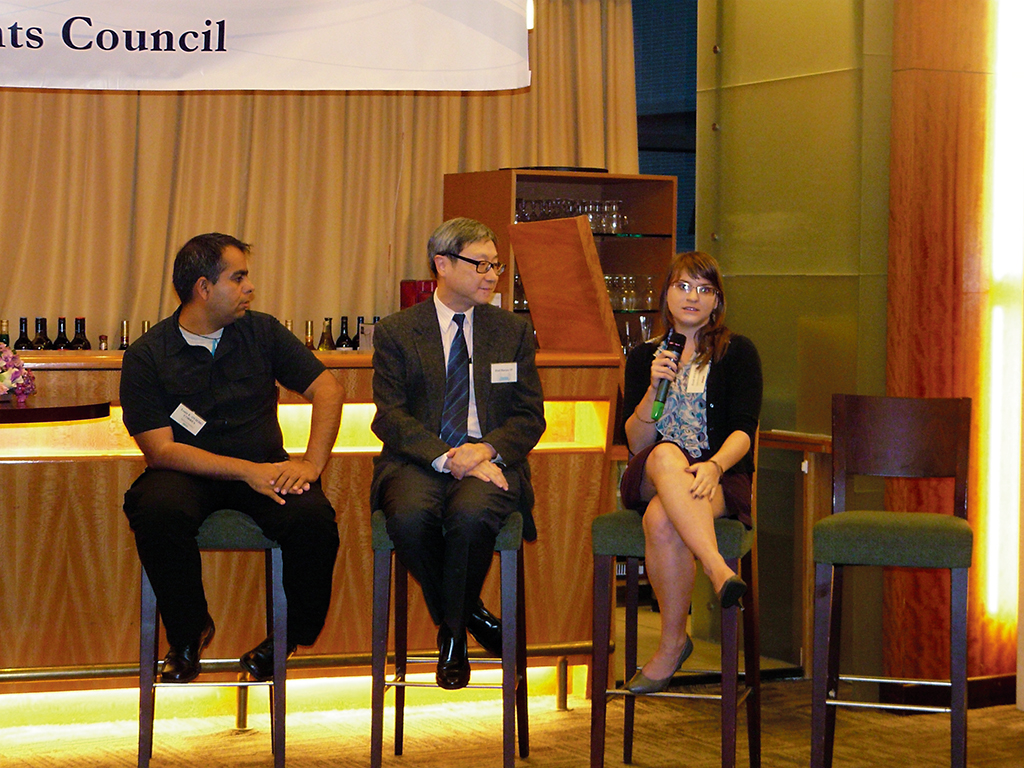
|
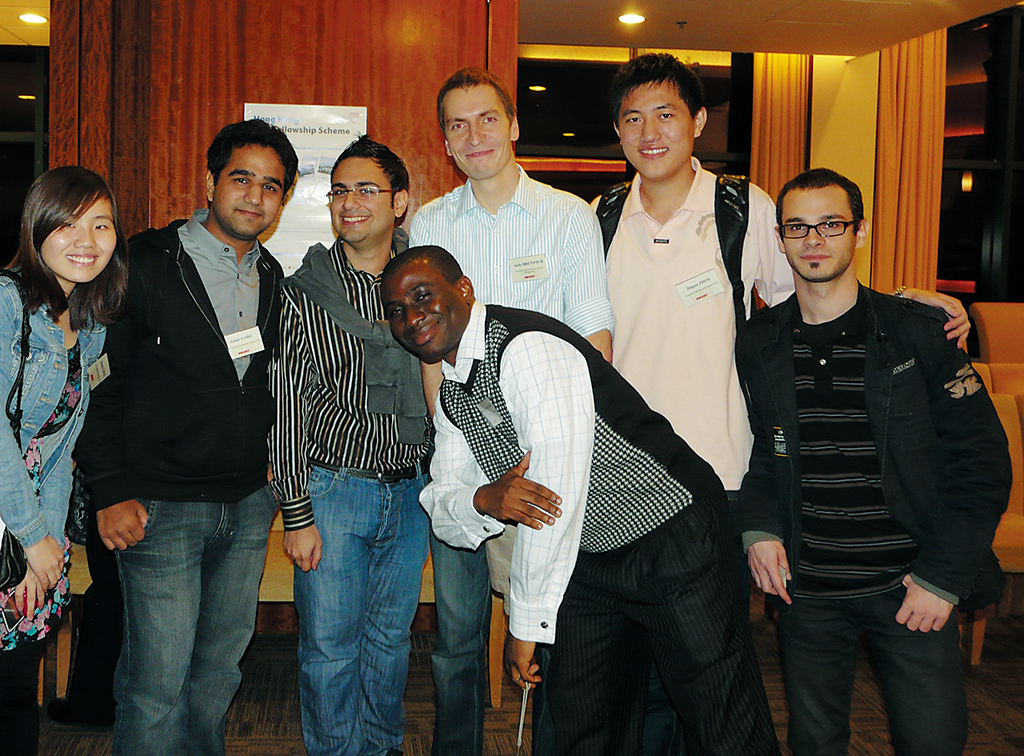
|
The awardees of the 2010/11 round of the Hong Kong PhD Fellowship Scheme, RGC members, and
representatives of institutions met at a tea reception on 4 November 2010 to exchange views and share
experiences |
Knowledge Transfer
The UGC promotes and incentivises the transfer of knowledge between institutions and the society, with
a view to bringing about socio-economic impact and improvements to the community and businesses.
Knowledge transfer encompasses a wide variety of activities, ranging from: transferring technology,
undertaking commissioned research from business sectors; licensing patent rights to industries for
product development; providing continuing professional education courses for specific fields; partnering with
NGOs to optimise their provision of community services; outreaching to public “research outcomes” in the form of
public talks, performance and exhibitions.
Since 2009/10 the UGC has introduced an additional
stream of recurrent funding earmarked for the institutions to strengthen and broaden their endeavours in “knowledge
transfer”. Institutions have all embraced “knowledge transfer” as the third pillar of their core activities (after teaching and research), they have set out
institutional-wide
strategies, policies, action plans and performance targets to embed and step up their efforts in knowledge
transfer, commensurate with their respective roles and missions. Given that the institutions have distinctive
roles and missions, and areas of strength, and are at different stages of development in knowledge transfer,
the strategies of institutions vary in terms of their aims and approaches. All institutions are also setting aside
some of their own funds to match the present knowledge transfer funding allocation in support of their strategy and
plans. By and large, the effort is focused on building up institutional capacity and broadening their endeavors in
knowledge transfer, specifically on three aspects –
(i) Capacity Building (e.g. dedicated knowledge
transfer office, databases, staff training, internal reach-out, process management)
(ii) Front-line knowledge
Transfer Activities (e.g. patent filing, publicity, incubating spin-off
companies)
(iii) knowledge Generation
(e.g. proof-of-concept projects, or matching funds for downstream research)
We were pleased to see that the first year effort was
successful and all institutions enhanced their internal culture, enabling environment (e.g. management structure
and staff incentives) and output volume for knowledge transfer. A marked increase was observed in both the
quality and quantity of knowledge transfer (on average over 20% growth in terms of volume), and the central
monitoring systems were also improved. The specific funding provided a fresh strategic impetus and inspired
growing enthusiasm within the institution for pursuing knowledge transfer.
With the institutions’ concerted and more conscious
efforts in knowledge transfer, academics and researchers are given more opportunities to be inspired by forging
closer ties with the larger community, and the community may enjoy greater, realizable benefits from the knowledge
transferred from the institutions. This two-way process enriches institutions’ research policies, thereby enhancing the international competitiveness of the local higher
education sector.
In November 2010, the UGC joined hands with the
Innovation and Technology Commission to sponsor the eight institutions to co-organise at Hong Kong Convention
and Exhibition Centre a large-scale “Knowledge Transfer Conference”, attracting over 400 renowned overseas
speakers, representatives from the industries and the businesses, senior management, academic staff,
knowledge transfer practitioners and students of our institutions. The conference explored a wide range of
aspects on knowledge transfer, with a full programme comprising business matching sessions, best practice
sharing, policy forum and workshops inspiring students’ entrepreneurship, etc. The event was well-received.
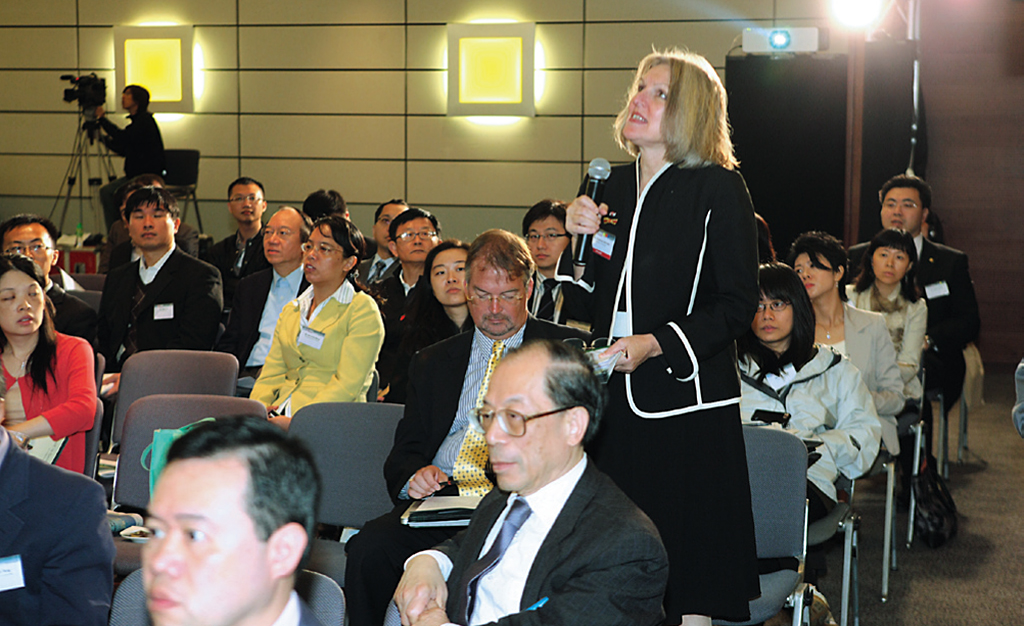
|
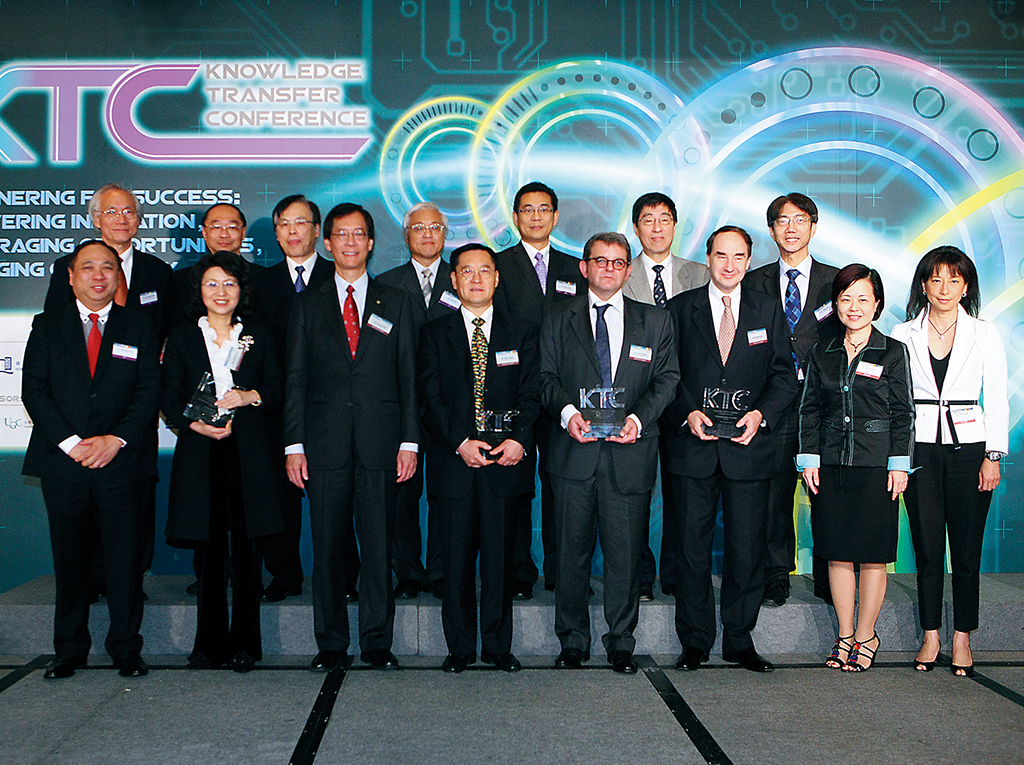
|
| The UGC joined hands with the Innovation and Technology Commission to sponsor the eight institutions to co-organise a
“Knowledge Transfer Conference” in November 2010 |
Allocation of Knowledge
Transfer Recurrent Funding to Institutions, 2010/11 ($ million)
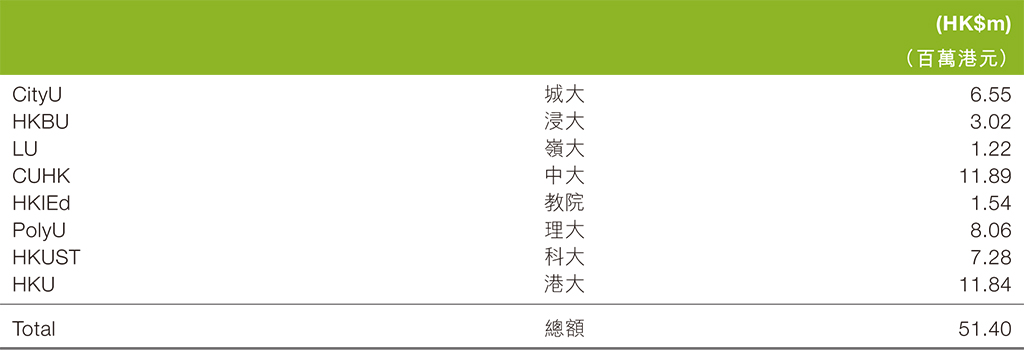
|



